Exeter City Supporters' Trust: How, 20 years on, fan ownership has seen Grecians thrive
- Published
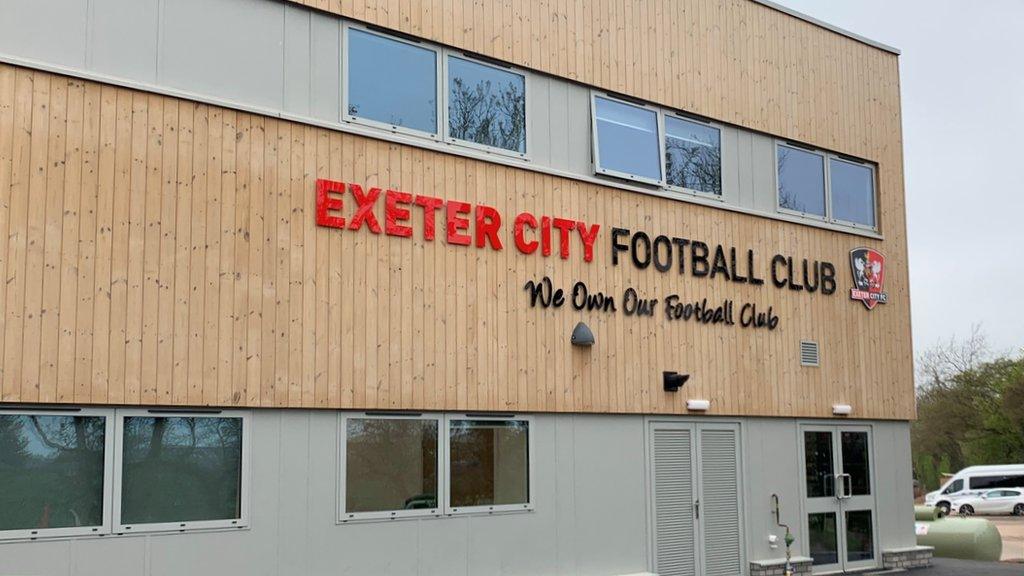
Exeter's new £3m training ground building is a far cry from what they had 20 years ago
"There was one member of staff with an old grey tractor, and it was stuck over there in a hole. He couldn't get out," says Exeter City president Julian Tagg.
"The groundsman, bless him, was in tears saying 'I'm doing my best'. That was where it started, so we've come a long way since those days."
Twenty years ago Exeter City were on the brink, with tractors stuck in holes on the training ground the least of their worries. The club had £4.8m worth of debt and years of mismanagement were biting hard. The Grecians' future was in doubt.
In May 2003 then chairman and vice-chairman John Russell and Mike Lewis left. The pair later pleaded guilty to fraud offences, external related to financial irregularities at the club.
Their departures led to Tagg and fellow Trust members Ian Huxham and Terry Pavey being appointed as club directors, and in doing so began the process which saw Exeter City Supporters' Trust take over their football club., external
That September they officially assumed control and became the first fan-owned club in England.
In the two decades that have followed, Exeter have gone from a side just relegated from what is now League Two into the National League to a club establishing itself again in League One, and having just completed a £3m training ground development.
"There was rumour and counter-rumour throughout that season of what was going on behind the scenes," the club's tannoy announcer for more than two decades, Barry Fulls, tells BBC Sport.
"So it became obvious that they weren't the answer - in fact they were dragging our club lower than it had ever been.
"So whatever transpired, they had to go, and of course it all unravelled afterwards with the court case.
"But something had to change, whether someone came in as an investor or, as ultimately happened, the fans got together and set up the Trust.
"It was a means to an end. We had to save our football club and that was the only serious offer on the table at the time."
'It's a bit like running your house - you don't spend money you haven't got'
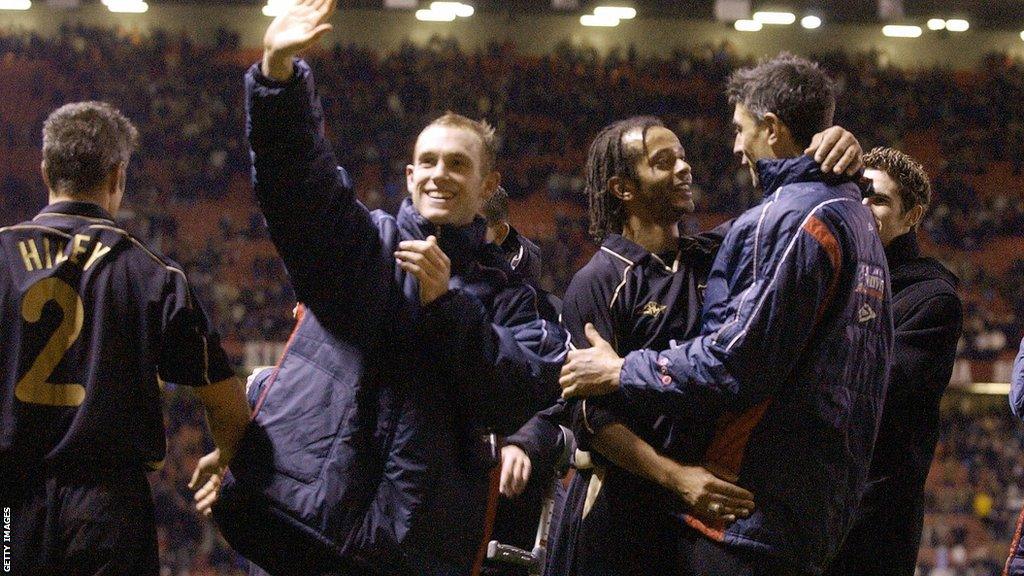
Exeter City's 0-0 draw at Manchester United in the FA Cup third round in 2005 helped clear their debts
It was an offer that was accepted, and the club has been steadily building its way back ever since.
Exeter's debts were wiped out by the money earned from a famous 0-0 FA Cup third round draw at Manchester United, external in January 2005, before a United side featuring Cristiano Ronaldo, Wayne Rooney, Ryan Giggs and Paul Scholes got a 2-0 win at St James Park, external in front of the television cameras in a Wednesday night replay.
And a lack of debt is something which has marked out the club as different from the rest ever since.
"It's a bit like running your house - you don't spend money you haven't got," current Trust chairman Nick Hawker explains to BBC Sport.
"That's the core to our ethos really - do as well as you possibly can, but do it within budget.
"That's one of the things that supporters can do because they do it day in, day out with their own lives."
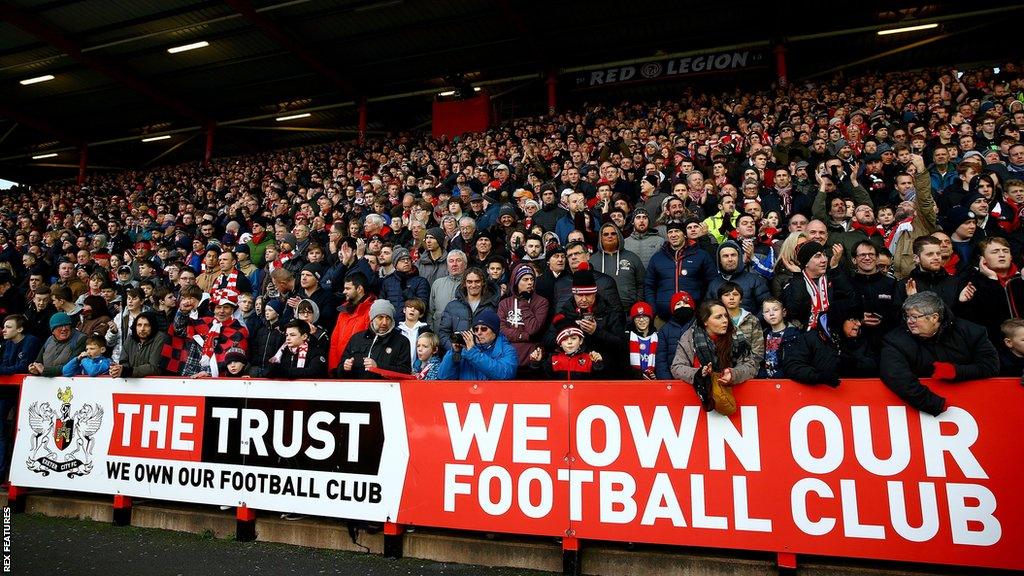
Exeter's fans can often be heard chanting 'We Own Our Football Club' during matches
Having lost to Morecambe in the Conference's play-off final in 2007, Exeter returned to Wembley 12 months later and beat Cambridge United 1-0 to return to the Football League.
There they have stayed ever since - they were promoted straight through to League One in 2009 before coming back down in 2012, and last May were promoted back to the third tier again after losing three play-off finals in five seasons.
The Trust has between 3,500 and 3,700 members paying a minimum of just £24 a year, and elect members to the club's board of directors in a supervisory role.
"The real message is we own it, we don't run it," says Hawker.
"Whatever skills we have on the club board, we'll put an equal number of Trust-appointed directors on that board.
"But their role is to ensure that the professional directors, if I can call them that, actually go about the business in the way that we would like them to go about it, rather than being a typical corporate organisation where money is everything."
That means things like a commitment to a real living wage, ensuring budgets balance, community engagement and promoting the club's academy.
"I think the fans really understand what we're trying to do and how we're trying to do it," says Tagg.
"You see all this philanthropy coming in and all these people from overseas buying in, that's not where we are, and I think the fans very much understand it, whilst it's a bit frustrating, but I think they appreciate that.
"It does take us longer to do most things, but when we do it, we do it right."
A future made in youth development
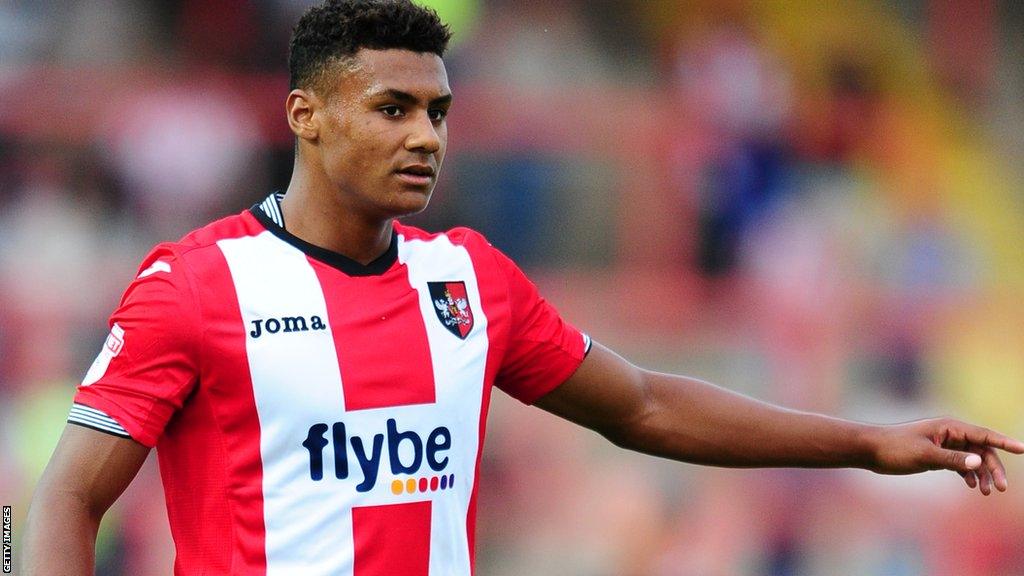
Ollie Watkins' transfer to Brentford, and subsequent sell-on clauses when he moved on to Aston Villa, has netted Exeter City around £6.5m
Most people in this part of Devon agree that Exeter's jewel in the crown is the club's youth academy.
With no rich benefactor to back the club in the transfer market, Exeter have had to produce their own players - both to staff their first team and provide revenue in player sales to other clubs.
England's Ollie Watkins, Wales' Ethan Ampadu, Swansea City captain Matt Grimes and Peterborough's Joel Randall have all left Exeter for fees in excess of £1m, while a host of other players have earned the club six-figure transfer fees.
"The night we won promotion there were seven academy players who started the game, and those academy players are big players now and are likely to be in demand during the summer," says Hawker.
"It's about finding your strength and what you can afford and really exploiting that."
He adds: "It's not just the people that go for million-pound transfers, but actually the people who play week in, week out.
"The academy's not luck, it's there by design and it's successful by design, and it's certainly one of the things that allows us to put a team on the pitch that can compete at this level."
Today's academy players now have use of a new £3m building that opened this year to replace a 'temporary' structure that was erected in 1974.
"It's possibly the greatest achievement of the Trust," says Fulls.
"Fans will always want a successful team on the pitch. We go to be entertained and we want to win things and we want promotions.
"You can spend money on players, they come and go with or without success. What the Trust has done is they've spent money wisely on the infrastructure which lays the foundations for success over a number of years."
"You set yourself these targets and somehow when you do that and see that vision, and you can see it in your mind, somehow you get there," Tagg proudly says outside the new training ground building.
"When you look back there's the Manchester United game, there's the Liverpool games, there's the 3G training pitch - but for me this is probably the biggest of all, to provide a facility for staff and for players that will take us to another level."
'Do we want boom or bust, or do we want sustainable growth?'
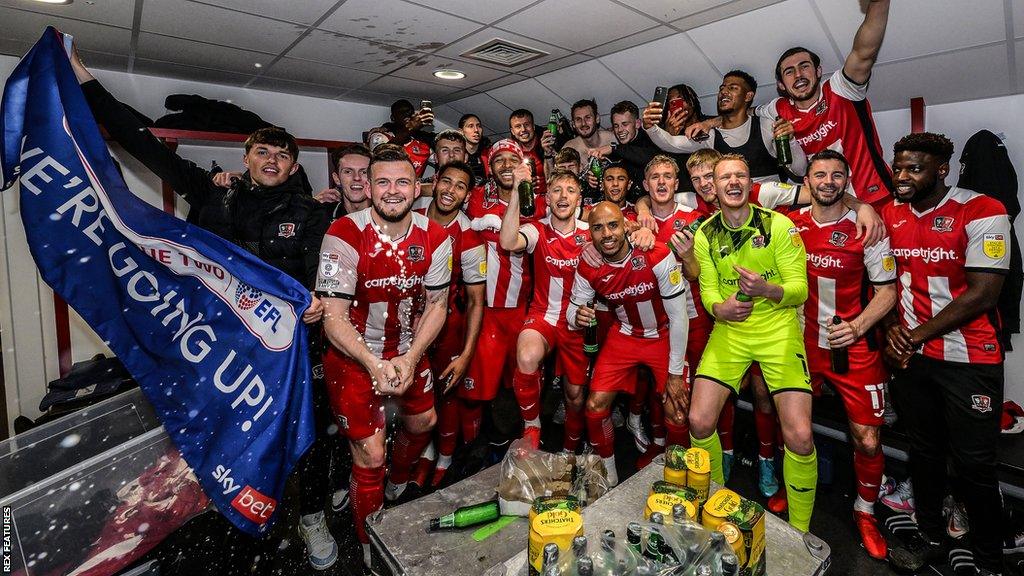
Exeter City returned to League One this season after coming second in League Two 12 months ago
But where does the future lie for fan-owned clubs with nation states and multi-billionaires buying sides in England?
How can a small club on a geographic limb like Exeter hope to compete with clubs that can spend many multiples of their budget?
"I think there's lots of clubs out there who have individual owners who perhaps by my standards are very wealthy people, but there's a ceiling for them as well because they're not going to be Glazer or a John W Henry," Hawker says.
"There's different levels of wealth, so everybody has a ceiling. I think what you have to do when you're in that space is work out how do you overcome it?
"You haven't got the money, so how do you compensate for that? We compensate through it with the academy."
In the 2018-19 season both Bury and Macclesfield beat Exeter home and away in League Two.
Yet four years on Exeter are mid-table in League One whilst both those clubs have gone bust and been forced to re-form at the base of the English pyramid.
For Fulls, the Trust has ensured a similar plight is unlikely to befall his beloved club.
"Football is boom or bust isn't it? We see so many clubs go through it," he added.
"Even in the Premier League there's clubs that have two or three seasons of success and then before you know it you're relegated.
"Do we want boom and bust, or do we want the sustainable growth that we've had over the last 20 years? I think I know which one I'd go for."